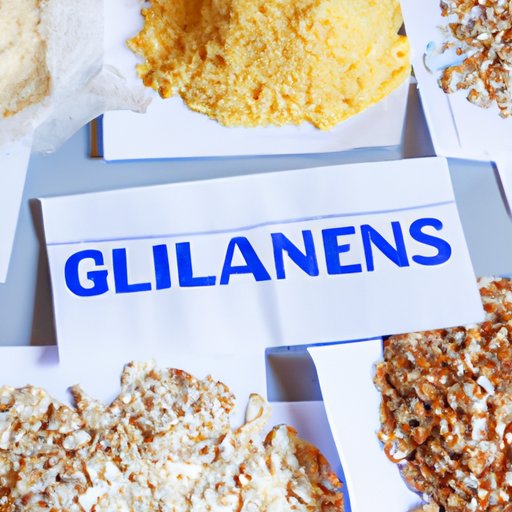
Introduction
The gluten-free diet has become increasingly popular in recent years for various reasons, including health benefits and the rise in individuals with gluten sensitivities and celiac disease. With oats being a popular breakfast food, many people are left wondering whether oats are gluten-free or not. This article aims to debunk myths surrounding oats and gluten and provide information on how to incorporate oats into a gluten-free diet.
The Truth about Oats and Gluten: Debunking Common Myths
There are two common myths regarding oats and gluten. Firstly, that oats contain gluten. Secondly, that oats are always cross-contaminated with gluten.
However, the truth is that oats themselves do not contain gluten. Gluten is a protein found in wheat, barley, and rye, but not in oats. Therefore, oats are naturally gluten-free.
Furthermore, cross-contamination can occur during the growing, harvesting, and processing of oats. Therefore, it is important to ensure that the oats are certified gluten-free and not processed on equipment that also processes wheat, barley, or rye.
Going Gluten-Free: Understanding the Oat Controversy
The gluten-free diet excludes foods that contain gluten, including wheat, barley, and rye. Oats are controversial in the gluten-free diet due to the potential cross-contamination with gluten during processing.
However, some studies have shown that consuming moderate amounts of pure, uncontaminated oats may be safe for individuals with celiac disease or gluten sensitivities.
It is important to note that oats do not have the same nutritional profile as wheat, barley, or rye. Therefore, individuals with celiac disease or gluten sensitivities should consult a healthcare professional before including oats in their diet.
Navigating the Gluten-Free Lifestyle: What You Need to Know About Oats
Choosing gluten-free oats can be challenging, as cross-contamination can occur during processing. Certified gluten-free oats are the safest option, as they have been tested for gluten and found to contain less than 20 parts per million, the FDA’s threshold for labeling a product gluten-free.
Proper storage and preparation of oats are also important in maintaining their gluten-free quality. It is recommended to store oats in an airtight container in a cool, dry place. Oats can be prepared in various ways, such as in hot cereal, overnight oats, or baked goods.
Gluten-Free Grains: Benefits and Drawbacks of Including Oats in Your Diet
Including oats in a gluten-free diet can provide several health benefits, such as lowering cholesterol levels, improving digestion, and stabilizing blood sugar levels. However, it is important to note that some individuals may still experience symptoms when consuming oats, as they contain a protein called avenin that may cause a reaction in some people with gluten intolerance.
Other gluten-free grains, such as quinoa and brown rice, can also provide nutritional benefits. It is important to incorporate a variety of gluten-free grains into a diet to ensure adequate nutrient intake.
A Closer Look at Oats: Are They Truly Gluten-Free?
While oats do not naturally contain gluten, they can be contaminated during processing. There are several potential factors contributing to gluten contamination in oats, such as cross-contamination with wheat, barley, or rye during growing or harvesting; the use of shared equipment in processing facilities; and contact with gluten-containing ingredients during transportation and storage.
Therefore, it is vital to choose certified gluten-free oats to ensure they meet the FDA’s standards for gluten-free labeling and have been tested for gluten content.
The Gluten-Free Debate Continues: New Research on Oats and Celiac Disease
Ongoing research is being conducted to determine whether oats are safe for individuals with celiac disease and gluten sensitivities. Recent studies have shown that consuming moderate amounts of pure, uncontaminated oats may be safe for most individuals with celiac disease, but further research is needed to determine long-term effects.
Individuals with celiac disease should consult a healthcare professional before consuming oats, as they may still experience symptoms even when consuming pure, uncontaminated oats.
From Avenin to Glutenin: Understanding the Science Behind Oats and Gluten
Oats contain different types of protein than wheat, barley, and rye. The protein in oats is called avenin, which is similar to gluten but is considered to be less toxic than glutenin, the protein found in wheat, barley, and rye. Some individuals with celiac disease or gluten intolerance may still experience symptoms when consuming oats, as avenin can cause a reaction in some individuals.
Conclusion
In conclusion, oats are naturally gluten-free, but cross-contamination can occur during processing. It is important to choose certified gluten-free oats and store and prepare them properly. Including oats in a gluten-free diet can provide several health benefits, but individuals with celiac disease or gluten sensitivities should consult a healthcare professional before consuming oats. Further research is being conducted to determine the safety of oats in a gluten-free diet.
If you’re uncertain about the safety of oats in your diet, consult a healthcare professional and choose certified gluten-free oats to ensure a safe, healthy, and balanced gluten-free lifestyle.




